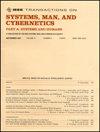An Adaptive Resource Allocation Strategy for Objective Space Partition-Based Multiobjective Optimization
IEEE Transactions on Systems Man and Cybernetics Part A-Systems and Humans
Pub Date : 2021-03-01
DOI:10.1109/TSMC.2019.2898456
引用次数: 54
Abstract
In evolutionary computation, balancing the diversity and convergence of the population for multiobjective evolutionary algorithms (MOEAs) is one of the most challenging topics. Decomposition-based MOEAs are efficient for population diversity, especially when the branch partitions the objective space of multiobjective optimization problem (MOP) into a series of subspaces, and each subspace retains a set of solutions. However, a persisting challenge is how to strengthen the population convergence while maintaining diversity for decomposition-based MOEAs. To address this issue, we first define a novel metric to measure the contributions of subspaces to the population convergence. Then, we develop an adaptive strategy that allocates computational resources to each subspace according to their contributions to the population. Based on the above two strategies, we design an objective space partition-based adaptive MOEA, called OPE-MOEA, to improve population convergence, while maintaining population diversity. Finally, 41 widely used MOP benchmarks are used to compare the performance of the proposed OPE-MOEA with other five representative algorithms. For the 41 MOP benchmarks, the OPE-MOEA significantly outperforms the five algorithms on 28 MOP benchmarks in terms of the metric hypervolume.基于目标空间划分的多目标优化自适应资源分配策略
在进化计算中,平衡多目标进化算法(moea)种群的多样性和收敛性是最具挑战性的课题之一。当分支将多目标优化问题(MOP)的目标空间划分为一系列子空间,且每个子空间保留一组解时,基于分解的moea对种群多样性是有效的。然而,如何在保持种群多样性的同时加强种群收敛是基于分解的moea面临的一个长期挑战。为了解决这个问题,我们首先定义了一个新的度量来衡量子空间对人口收敛的贡献。然后,我们开发了一种自适应策略,根据每个子空间对种群的贡献为每个子空间分配计算资源。基于以上两种策略,我们设计了一种基于目标空间划分的自适应MOEA,称为OPE-MOEA,以提高种群收敛性,同时保持种群多样性。最后,使用41个广泛使用的MOP基准来比较所提出的OPE-MOEA与其他五种代表性算法的性能。在41个MOP基准测试中,OPE-MOEA在度量超容量方面显著优于28个MOP基准测试中的五种算法。
本文章由计算机程序翻译,如有差异,请以英文原文为准。
求助全文
约1分钟内获得全文
求助全文
来源期刊
自引率
0.00%
发文量
1
审稿时长
6.0 months
期刊介绍:
The scope of the IEEE Transactions on Systems, Man, and Cybernetics: Systems includes the fields of systems engineering. It includes issue formulation, analysis and modeling, decision making, and issue interpretation for any of the systems engineering lifecycle phases associated with the definition, development, and deployment of large systems. In addition, it includes systems management, systems engineering processes, and a variety of systems engineering methods such as optimization, modeling and simulation.

 求助内容:
求助内容: 应助结果提醒方式:
应助结果提醒方式:


